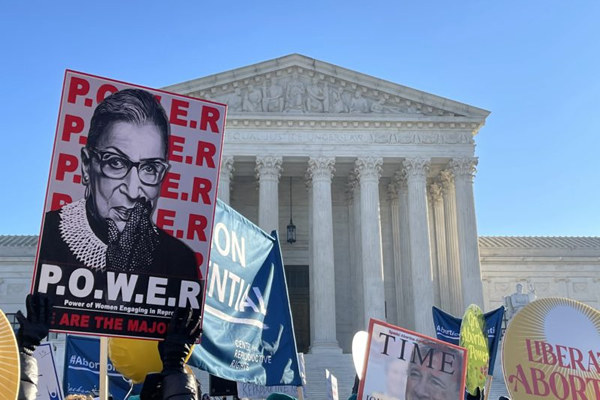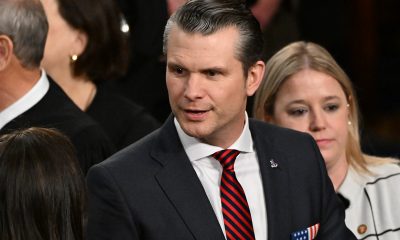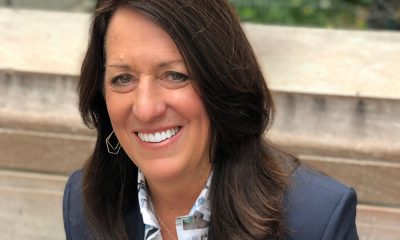National
Does a potential overturn of Roe imperil LGBTQ rights?
Some fear that Obergefell marriage decision could fall

The oral arguments before the justices of the United States Supreme Court had barely ended in the case brought by the state of Mississippi defending its law banning abortion after 15 weeks, Dobbs v. Jackson Women’s Health Organization, when alarms were set off in legal circles as some argued that Obergefell v. Hodges — the same-sex marriage decision — would be in danger should the high court rule to overturn Roe v. Wade.
Florida State University law professor Mary Ziegler, appearing on NPR’s ‘Heard on All Things Considered,’ told host Mary Louise Kelly that there was a basis for concern over whether the court would actually overrule its precedents in other cases based on the questions and statements raised during the hearing by the conservative members of the court.
Asked by Kelly if she saw a legal door opening Ziegler affirmed that she did. Kelly then asked her, “Them taking up cases to do with that. What about same-sex marriage?”
Ziegler answered, “Yeah, same-sex marriage is definitely a candidate. Justices Alito and Thomas have in passing mentioned in dicta that they think it might be worth revisiting Obergefell v. Hodges – the same-sex marriage decision.
“And I think it’s fair to say that in the sort of panoply of culture war issues, that rights for same-sex couples and sexual orientation are still among the most contested, even though certainly same-sex marriage is more subtle than it was and than abortion was.
“I think that certainly the sort of balance between LGBTIQ rights and religious liberty writ large is a very much alive issue, and I think some states may try to test the boundaries with Obergefell, particularly knowing that they have a few justices potentially willing to go there with them.”
As almost if to underscore the point raised by Ziegler during the hearing, Associate U.S. Supreme Court Justice Sonia M. Sotomayor pointed out that the high court has taken and “discerned” certain rights in cases from the Constitution.
Along with abortion, the court has “recognized them in terms of the religion parents will teach their children. We’ve recognized it in their ability to educate at home if they choose,” Sotomayor said. “We have recognized that sense of privacy in people’s choices about whether to use contraception or not. We’ve recognized it in their right to choose who they’re going to marry.”
In following up the cases cited by Justice Sotomayor, Associate U.S. Supreme Court Justice Amy Coney Barrett asked Mississippi Solicitor General Scott Stewart, who was defending the state’s abortion law, whether a decision in his favor would affect the legal precedents in those cases cited by Justice Sotomayor.
In his answer to Justice Barrett, the state’s Solicitor General said cases involving contraception, same-sex marriage and sodomy wouldn’t be called into question because they involve “clear rules that have engendered strong reliance interests and that have not produced negative consequences or all the many other negative stare decisis considerations we pointed out.”
However, Lambda Legal Chief Strategy Officer and Legal Director, Sharon McGowan had a different take and interpreted remarks by Associate U.S. Supreme Court Justice Brett Kavanaugh to mean that the decisions in Lawrence v. Texas, which decriminalized private sexual intimacy between same-sex couples, and Obergefell v. Hodges, which struck down remaining bans on the freedom of same-sex couples to marry, would actually justify overturning Roe v. Wade.
In a publicly released media statement McGowan noted: “During today’s argument, Justice Kavanaugh suggested that two key Supreme Court decisions protecting LGBTQ civil rights—Lawrence v. Texas and Obergefell v. Hodges—support overruling Roe v. Wade and Planned Parenthood v. Casey.
‘To that we say, NOT IN OUR NAME. LGBTQ people need abortions. Just as important, those landmark LGBTQ decisions EXPANDED individual liberty, not the opposite. They reflected the growing societal understanding of our common humanity and equality under law.
“Just as the Supreme Court in Brown v. Board of Education rejected the lie of ‘separate but equal,’ the Supreme Court’s decisions in Lawrence and Obergefell appropriately overruled precedent where it was clear that, as was true with regard to race, our ancestors failed properly to acknowledge that gender and sexual orientation must not be barriers to our ability to live, love, and thrive free of governmental oppression. …
“These landmark LGBTQ cases, which Lambda Legal litigated and won, and on which we rely today to protect our community’s civil rights, were built directly on the foundation of Casey and Roe. Our interests in equal dignity, autonomy, and liberty are shared, intertwined, and fundamental.”
On Sunday, the Blade spoke with Shannon Minter, legal director for the National Center for Lesbian Rights, a national LGBTQ+ legal organization that represented three same-sex couples from Tennessee, whose case was heard by the U.S. Supreme Court along with Obergefell and two other cases.
Minter is urging caution in how people interpret the court arguments and remarks made by the justices.
“We should be cautious about taking the bait from anti-LGBTQ groups who falsely argue that if the Supreme Court reverses or undermines Roe v. Wade, they are likely to reverse or undermine Obergefell or Lawrence. In fact, that is highly unlikely, as the argument in Dobbs itself showed,” he said.
“The only reason Justice Kavanaugh mentioned Obergefell and Lawrence, along with Brown v. Board of Education, was to cite them as examples of cases in which the Supreme Court clearly did the right thing. All of those decisions rely at least as strongly on equal protection as on fundamental rights, and even this extremely conservative Supreme Court has not questioned the foundational role of equal protection in our nation’s constitutional law,” Minter stressed.
During an interview with Bloomberg magazine, David Cortman, of the Scottsdale, Ariz.-based anti-LGBTQ legal group Alliance Defending Freedom, which has been listed by the Southern Poverty Law Center as an extremist hate group, said “two things in particular distinguish abortion from those other privacy rights: the right to life and the states’ interest in protecting a child.”
Cortman, whose group urged the justices to allow states to ban same-sex marriages, said those other rights may be just as wrong as the right to an abortion. “But the fundamental interest in life that’s at issue in abortion means those other rights are probably not in any real danger of being overturned.”
But Cortman is of the opinion that there is little impetus among the court’s conservatives to take up challenges to those cases.
However, the fact that the six to three makeup of the high court with a conservative majority has progressives clamoring for the public to pay closer attention and be more proactively engaged.
Kierra Johnson, executive director of the National LGBTQ Task Force, in an emailed statement to the Blade underscored those concerns:
“Reports and analysis coming out of Wednesday’s Supreme Court hearing on Dobbs v. Jackson Women’s Health Organization are extremely disturbing and represent a threat to our individual constitutional rights to privacy and autonomy. There is no ‘middle ground’ on what the Constitution guarantees and what was decided decades ago with the Roe v Wade decision.
“This is about liberty, equality, and the rule of law, not the political or partisan views of those sitting on the bench. The unprecedented decision to remove a constitutional right recognized by the Supreme Court 50 years ago would set back civil rights by decades. ….
“Abortion access is essential, and a fundamental right under the U.S. Constitution. Bans on abortion are deeply racist and profoundly sexist – the harshest impacts fall on Black and Brown women and pregnant people and on our families and communities.
“If you think this decision will not affect you, think again: a wrong decision by the Supreme Court means you, too, will lose your bodily autonomy, your ability to own your own personal and community power. This is not just about abortion; it is about controlling bodies based on someone else determining your worthiness. This is a racial justice issue. This is a women’s issue. It is an LGBTQ issue. It is a civil rights issue. These are our fundamental rights that are at stake.”
U.S. Military/Pentagon
Pentagon urged to reverse Naval Academy book ban
Hundreds of titles discussing race, gender, and sexuality pulled from library shelves

Lambda Legal and the Legal Defense Fund issued a letter on Tuesday urging U.S. Defense Secretary Pete Hegseth to reverse course on a policy that led to the removal of 381 books from the Nimitz Library of the U.S. Naval Academy in Annapolis, Md.
Pursuant to President Donald Trump’s executive order 14190, “Ending Radical Indoctrination in K-12 Schooling,” the institution screened 900 titles to identify works promoting “diversity, equity, and inclusion,” removing those that concerned or touched upon “topics pertaining to the experiences of people of color, especially Black people, and/or LGBTQ people,” according to a press release from the civil rights organizations.
These included “I Know Why the Caged Bird Sings” by Maya Angelou, “Stone Fruit” by Lee Lai, “The Hate U Give” by Angie Thomas, “Lies My Teacher Told Me: Everything Your American History Textbook Got Wrong” by James W. Loewen, “Gender Queer: A Memoir” by Maia Kobabe, and “Democracy in Black: How Race Still Enslaves the American Soul” by Eddie S. Glaude, Jr.
The groups further noted that “the collection retained other books with messages and themes that privilege certain races and religions over others, including ‘The Clansman: A Historical Romance of the Ku Klux Klan’ by Thomas Dixon, Jr., ‘Mein Kampf’ by Adolf Hitler, and ‘Heart of Darkness’ by Joseph Conrad.
In their letter, Lambda Legal and LDF argued the books must be returned to circulation to preserve the “constitutional rights” of cadets at the institution, warning of the “danger” that comes with “censoring materials based on viewpoints disfavored by the current administration.”
“Such censorship is especially dangerous in an educational setting, where critical inquiry, intellectual diversity, and exposure to a wide array of perspectives are necessary to educate future citizen-leaders,” Lambda Legal Chief Legal Officer Jennifer C. Pizer and LDF Director of Strategic Initiatives Jin Hee Lee said in the press release.
Federal Government
White House sues Maine for refusing to comply with trans athlete ban
Lawsuit follows months-long conflict over school sports in state

The Justice Department is suing the state of Maine for refusing to comply with President Donald Trump’s executive order banning transgender athletes from participating in school sports, U.S. Attorney General Pam Bondi announced on Wednesday.
DOJ’s lawsuit accuses the state of violating Title IX rules barring sex discrimination, arguing that girls and women are disadvantaged in sports and deprived of opportunities like scholarships when they must compete against natal males, an interpretation of the statute that reverses course from how the law was enforced under the Biden-Harris administration.
“We tried to get Maine to comply” before filing the complaint, Bondi said during a news conference. She added the department is asking the court to “have the titles return to the young women who rightfully won these sports” and may also retroactively pull federal funding to the state for refusing to comply with the ban in the past.
Earlier this year, the attorney general sent letters to Maine, California, and Minnesota warning the blue states that the department “does not tolerate state officials who ignore federal law.”
According to the Maine Principals’ Association, only two trans high school-aged girls are competing statewide this year. Conclusions from research on the athletic performance of trans athletes vis-a-vis their cisgender counterparts have been mixed.
Trump critics and LGBTQ advocates maintain that efforts to enforce the ban can facilitate invasive gender policing to settle questions about an individual athlete’s birth sex, which puts all girls and women at risk. Others believe determinations about eligibility should be made not by the federal government but by school districts, states, and athletics associations.
Bondi’s announcement marked the latest escalation of a months-long feud between Trump and Maine, which began in February when the state’s Democratic governor, Janet Mills, declined to say she would enforce the ban.
Also on Wednesday, U.S. Education Secretary Linda McMahon said the findings from her department’s Title IX investigation into Maine schools — which, likewise, concerned their inclusion of trans student-athletes in competitive sports — was referred to DOJ.
Earlier this month, the Justice Department pulled $1.5 million in grants for Maine’s Department of Corrections because a trans woman was placed in a women’s correctional facility in violation of a different anti-trans executive order, while the U.S. Department of Agriculture paused the disbursement of funds supporting education programs in the state over its failure to comply with Title IX rules.
A federal court last week ordered USDA to unfreeze the money in a ruling that prohibits the agency from “terminating, freezing, or otherwise interfering with the state’s access to federal funds based on alleged Title IX violations without following the process required by federal statute.”
Federal Government
Expert warns Trump’s drastic cuts to HHS will have far-reaching consequences
HRC’s HIV and LGBTQ health policy advocate shared his concerns with the Blade

Ten years ago, as the opioid epidemic ripped through communities across the United States, the recreational use of oxymorphone with contaminated needles led to an explosion of new HIV infections in southern Indiana’s Scott County.
In places like Austin, a city with about 4,000 residents, the rate of diagnoses quickly ballooned to levels seen in some of the hardest-hit nations of sub-Saharan Africa, more than 50 times higher than the national average.
Thankfully, by 2020, NPR reported that the area was rebounding from what was the most devastating drug-fueled HIV epidemic that rural America had ever experienced, with three-quarters of patients managing the disease so well with antiretroviral therapies that their viral loads were undetectable.
Five years after officials called a public health emergency over the outbreak in Scott County, Austin had opened new addiction treatment centers, support groups, and syringe exchanges.
Initially, Indiana’s response was sluggish. The state’s governor at the time, Mike Pence, opposed clean needle exchanges for 29 days before ultimately signing an executive order allowing for a state-supervised program.
The administration in which he would go on to serve as vice president, however, launched an ambitious initiative designed around the objective of ending the HIV epidemic in the U.S. by the end of the decade, using proven public health strategies including syringe exchanges.
NPR further noted “the administration’s HIV goals were championed” by Pence along with Trump’s U.S. Surgeon General, Jerome Adamsthe, who was Indiana’s health commissioner during the outbreak in Austin.
Still, the news service warned, the Centers for Disease Control and Prevention determined that 220 U.S. counties were vulnerable to outbreaks of HIV and other blood borne infectious diseases like hepatitis C.
“When you have these outbreaks, they affect other states and counties. It’s a domino effect,” Dr. Rupa Patel, an HIV prevention researcher at Washington University in St. Louis, told NPR. “We have to learn from them. Once you fall behind, you can’t catch up.”
Trump’s approach to public health, including efforts to prevent, detect, mitigate, and treat outbreaks of infectious diseases, looks radically different in his second term.
‘I don’t know why they hate public health so much’
The Washington Blade spoke with Matthew Rose, senior public policy advocate for the Human Rights Campaign, during a recent interview about the the administration’s dramatic cuts and mass layoffs that will totally reshape the way America’s health agencies are run under Trump’s secretary of the U.S. Department of Health and Human Services, Robert F. Kennedy, Jr.
“They’re dismantling all the things around” the first Trump administration’s Ending the HIV Epidemic in the U.S. effort, he said, eliminating key positions and offices within America’s health agencies that support this effort, including by tracking progress toward — or movement away from — the 2030 goalposts.
Rose said there is no evidence to suggest the initiatives combatting HIV that were begun when Trump was in office the first time were ineffective, either in terms of whether their long term cost-savings justified the investment of government resources to administer them or with respect to data showing measurable progress toward ending the epidemic within the decade.
Therefore and in the absence of an alternative explanation,, Rose said he is left with the impression that the Trump-Vance administration does not care about Americans’ public health, especially when it comes to efforts focused on disfavored populations, such as programs supporting access to PrEP to reduce the risk of HIV transmission through sex.
The outbreak in Scott County “can happen over and over again, if we don’t have CDC surveillance,” he warned. “We’re still having a fentanyl crisis in the country that we don’t seem to really want to deal with, but you end up with outbreaks that bloom and bloom very quick and very fast.”
Rose added, “The really crazy thing is that they got rid of disease intervention and branch and response,” referring to the CDC’s National Center for HIV, Viral Hepatitis, STD, and Tuberculosis Prevention, specifically its Division of HIV Prevention, and the various branches within that division that are responsible for different aspects of HIV prevention, care, and research. They include HIV Research, Behavioral and Clinical Surveillance, and Detection and Response.
“These are literally the disease detectives that chase down outbreaks,” Rose added. “When there’s a syphilis outbreak in an area, when COVID came along and we had to trace COVID outbreaks, like, those folks are the folks who do this.”
If (or perhaps when) communities experience an outbreak, “We wouldn’t truly know what’s going on until probably 10 years later, when those folks’ CD4 counts finally crash to an AIDS diagnosis level,” he said, at which point “they’re very, very sick.”
“They’ll start looking like we haven’t seen people look since probably 30, 40 years ago,” Rose said, a time well before the advent of highly effective medicines that from the perspective of many patients turned HIV from a death sentence to a manageable disease.
Additionally, “every person that we lose to follow up and care, if they don’t know their status, that’s where the majority of new diagnoses come from,” he said, noting that without the CDC’s work “bringing people back into care,” there is “no way of tracking that.” HIV positive people will continue to potentially transmit the disease to others as “their own health deteriorates at levels that it doesn’t need to deteriorate at,” Rose said, “so, we make it worse.”
Along with the breakthroughs in drug discovery that led to the introduction of highly efficacious and well tolerated antiretrovirals, the use of PrEP by those who are HIV-negative to drastically reduce the risk that they may contract the virus through sex has put the goal of eliminating the epidemic within reach.
“One of the things we learned from things like the PROUD study,” Rose said, referring to randomized placebo-controlled HIV trials conducted in the U.K. in 2016 “ is that if you can get to the highest impacted folks, the most vulnerable folks, for every one person you get on PrEP, you’re getting anywhere from 16 to 23 infections averted.”
Disparities in health outcomes are likely to worsen
Rose noted that “we’re finally starting to stabilize” the disproportionately high rate of new infections among gay and bisexual Black men who have sex with men thanks in large part to the federal government’s work by employees and divisions that were cut by Kennedy’s restructuring of HHS, initiatives like culturally competent public health messaging campaigns for vulnerable populations, addressing subjects like PrEP, other prevention methods, the importance of regular HIV/STI screenings, and the availability of treatments for HIV and other sexually transmitted infections.
There is no way of knowing if any intervention was effective in the absence of “surveillance units” to monitor the disease’s spread through communities and track mitigation efforts, he said, adding that the gutting of these positions comes as “Latin men have actually been catching [up to] Black men in terms of new diagnoses” while rates among Black and Latina trans women remain high.
Along with NCHHSTP’s Prevention Communication Branch, the health secretary’s near 20 percent cut to CDC staff also eliminated the center’s Division of Behavioral & Clinical Surveillance Branch, its Capacity Development Branch, its Quantitative Sciences Branch, and its HIV Research Branch.
As a result, Rose said “You’re going to see these populations get hit hardest again,” communities that have long suffered disproportionately from the HIV epidemic due to factors like racial or income-based disparities in access to testing and treatment.
Broadly, the CDC is distinguished from other agencies because the Atlanta-based agency’s remit is focused to a significant extent on the population level implementation of public health interventions, endeavoring to change health outcomes, he explained. With respect to PrEP, for example, once the drug was shown safe and effective in clinical research and the evidence supported its use as a critical tool in the federal government’s effort to stop the epidemic, the CDC is responsible for work like making sure at-risk populations who are disinclined to use condoms can stick with (or are sticking with) the medication regimen.
The administration’s cuts encompass programs on the research side as well as the implementation side, Rose said. For example, he pointed to the “decimation” of divisions within the National Institutes of Health’s National Institute of Allergy and Infectious Diseases, which conducts studies on HIV interventions from the preclinical basic science stage to double blind clinical trials such as those that led to the introduction of injectable PrEP, which can be administered once every other month after the first two doses.
In fact, Rose said he worked alongside Dr. Jeanne Marrazzo, who succeeded Dr. Anthony Fauci as head of NIAID, on the Microbicide Trials Network board looking for behaviorally congruent HIV prevention products for populations that might not wish to take an oral or injectable formulation of PrEP. He added that she is a “brilliant scientist” who helped him better understand the vaginal microbiome as well as the ways in which “we fall short on women’s health and women’s sexual health, and what that means in the context of HIV prevention.”
Together with other top officials like Dr. Jonathan (“Jono”) Mermin, who led the NCHHSTP, on or around April 1, Marrazzo was reportedly offered the chance to either be placed on administrative leave or relocate to Indian Health Service outposts in rural American Indian or Native Alaskan communities located in states like Montana, Oklahoma, and Alaska.
Infectious disease related risks and benefits of research extend beyond HIV
Rose stressed the risks presented by the administration’s decision to shutter divisions within NCHHSTP that were responsible for communications, education and behavioral studies around tuberculosis, especially provided how the disease is underdiscussed as a public health issue within U.S, borders — where rates of infection are elevated in certain communities, like unhoused and incarcerated populations, where queer folks are disproportionately represented.
The restructuring of NCHHSTP and NIAID also raises the chances of outbreaks of viral and bacterial infections spread through sex that these public health workers could have prevented or better contained, Rose said.
Instead, “for some reason, someone thought it was a good idea to get rid of labs at the Division of STIs,” at a time when “we’ve had increases in STIs for the last, like, six years,” including rising rates of congenital syphilis, “the one that kills babies” and increased diagnoses of the disease among gay men.
Additionally, Rose noted disparities in health outcomes for people living with hepatitis C are likely to worsen by the cessation of federal government initiatives to slow the spread of the disease — which co-infects one of every four patients with HIV and can be fatal if untreated because the virus can cause cirrhosis, cancer, failure of the liver — because direct acting antivirals that cure 95 percent of all cases are covered by most insurance plans only when the policyholder has already sustained severe liver damage.
Broadly, “the fact that we’re like, getting rid of the labs to test people means that we’re literally choosing to go backwards, stick our heads in the sand, and hope that no one has the ability to want to say anything,” he added.
Even populations who are less susceptible to infection with diseases like HIV stand to benefit from basic and clinical science research into the disease, Rose said.
He pointed to such examples as the drug discovery studies targeting a vaccine for HIV that ultimately led to the identification of combinations of antivirals that were capable of curing most cases of hepatitis C, the inclusion of participants with HIV in clinical trials that led to the introduction of Ebola vaccines, and breakthroughs in the biomedical understanding of aging that were reached through research into why patients with untreated HIV age more rapidly.
“We continuously find new scientific endeavors that are able to help the general population, but also able to help the LGBTQ population,” Rose said, as “the things that happen in the HIV space spill over to other places.”
“From the LGBTQ health perspective, and especially from the research side,” he said, “we have just, in the last decade, started to really think about what interventions those populations need — not just [with respect to] HIV, but [other health issues like] smoking, alcohol and substance use and abuse,” including “crystal meth, which is always the number two drug in most major cities.”
Likewise, as large swaths of America’s public health infrastructure are unraveled under the direction of the president and his health secretary, the dissolution of each position or each division should not be considered in isolation given (1) the interdisciplinary nature of the work in which these individuals and entities are engaged and (2) the administration’s efforts elsewhere to restrict access to healthcare, especially for disfavored populations like trans and gender-diverse communities.
“There’s first the attack on the research pipeline,” Rose said, such as the HIV Vaccine Trials Network’s identification of an urgent or unmet need (behaviorally congruent methods of HIV prevention for women) and its discovery of a new intervention through research and clinical trials (a ring worn inside the vagina that releases an antiretroviral drug to stop the virus from entering the body during sex).
“Then there’s the destruction of key health interventions,” he said. For example, “STI testing is a public health intervention. It keeps people healthy, and we’re able to reduce the amount of STI floating in populations” through regular testing and monitoring of new diagnoses. “Getting rid of programs that look at and support these [efforts] is really, really bad,” Rose said.
He noted that the administration has endeavored to restrict healthcare access along a variety of fronts, especially when it comes to transgender medicine for youth, Rose said, from working to pass regulations circumscribing the scope of the ACA’s coverage mandate to gutting the HHS Office of Civil Rights such that vulnerable populations have less recourse when they are denied access to care or experience unlawful discrimination in healthcare settings, and conditioning the government’s federal funding for providers and hospital systems on their agreement not to administer guideline directed, evidence based interventions for the treatment of gender dysphoria in youth.
“Last year, CDC documented that we had reduced new HIV infections by 6% and by 23% and 26% in counties that were in the Ending the Epidemic jurisdictions,” Rose said.
In the face of these challenges shortly into the president’s second term, he said, “we will stand up to a scientific rigorous process every time, because we’ve done it every time, and every time we’ve done it, the world has been better for it.”
-

 District of Columbia3 days ago
District of Columbia3 days agoReenactment of 1965 gay rights protest at White House set for April 17
-

 Maryland3 days ago
Maryland3 days agoFreeState Justice: Transgender activist ‘hijacked’ Moore’s Transgender Day of Visibility event
-

 Hungary3 days ago
Hungary3 days agoHungarian MPs amend constitution to ban public LGBTQ events
-

 Real Estate4 days ago
Real Estate4 days agoNavigating DMV real estate market during political unrest











